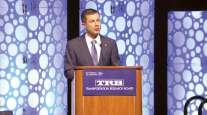Senior Reporter
USDOT Updates Innovation, Technology Principles

[Stay on top of transportation news: Get TTNews in your inbox.]
The federal regulatory landscape for transportation operations must prioritize safety, economic growth and climate change, the leadership at the U.S. Department of Transportation recently affirmed in a series of guiding principles.
To improve transportation users’ access to technological advancements anchored on safety features, the department updated a statement of priorities meant to reflect President Joe Biden’s vision for the country’s mobility networks.
Specifically, the department noted officials would benefit by pursuing policies that would facilitate the development of infrastructure capable of withstanding the impact of severe weather events. Such infrastructure resilience would need to complement the adoption of technologies that would boost safety and communication across transportation modes.
Innovation should work for the American people. Innovation is high-tech like drones, medium-tech like bike share and sometimes low-tech like converting a parking space into a dining room. With these new principles we're ensuring a transportation future that meets American needs. — TransportationGov (@USDOT) January 6, 2022
“Innovations should reduce deaths and serious injuries on our nation’s transportation network, while committing to the highest standards of safety across technologies,” per the “U.S. DOT Innovation Principles” updated Jan. 6.
“The department must play a meaningful role in future-proofing infrastructure, enabling adaptability and resilience, and helping communities and public sector partners to bring legacy systems into the digital age,” according to the document. Additionally: “The department should identify opportunities for interoperability among innovations and foster cross-modal integration. In addition, DOT’s posture must remain nimble, with a commitment to support technologies that further our policy goals.”
These innovative guidelines were outlined this month as part of the department’s role in implementing the Infrastructure Investment and Jobs Act, a $1 trillion infrastructure law enacted in November.
An emphasis on safeguarding the transportation workforce, embracing data and sharing insights, as well as collaborating with private sector stakeholders also were cited in the department’s guiding document.
At the CES 2022 conference this month, Transportation Secretary Pete Buttigieg, tasked with leading aspects of the infrastructure law’s implementation, pointed to the role the federal apparatus has in helping to achieve advancements in innovation. “As policymakers we have to prioritize. We need to assess which important innovations will develop on their own and which require federal support for basic research. We must consider when a technology should be given as much room as possible to develop on an experimental basis and when it’s reached the point when it raises concerns that require regulation to keep the American people safe,” he said.

New year, new resilience. Host Mike Freeze and reporters Connor Wolf and Eugene Mulero uncover the lessons 2020 and 2021 taught trucking's business leaders and consider business and legislative solutions in the year ahead. Hear a snippet above, and get the full program by going to RoadSigns.TTNews.com.
“The current decade is especially full of challenges and opportunities from developments in transportation technology,” Buttigieg continued. “We are witnessing the rise of electric and autonomous vehicles, the widespread adoption of recreational and commercial drones, renewed attention to cybersecurity vulnerabilities in our infrastructure, increasingly routine commercial space travel and, perhaps most urgently, the high-stakes race to dramatically reduce transportation’s impact on our climate before it’s too late.”
Relatedly, the department, under Buttigieg’s leadership, is readying a strategic plan meant to tackle near- and long-term objectives to “invest in our transportation system to provide American workers and businesses reliable and efficient access to good-paying jobs, resources, and markets.”
The plan’s key objectives include safety, economic growth, equity, climate and sustainability, and organizational excellence. As the department noted, the plan’s aim is to “strengthen our world-class organization.” Also, to “advance the department’s mission by establishing policies, processes, and an inclusive and innovative culture to effectively serve communities and responsibly steward the public’s resources.”
Want more news? Listen to today's daily briefing below or go here for more info:




